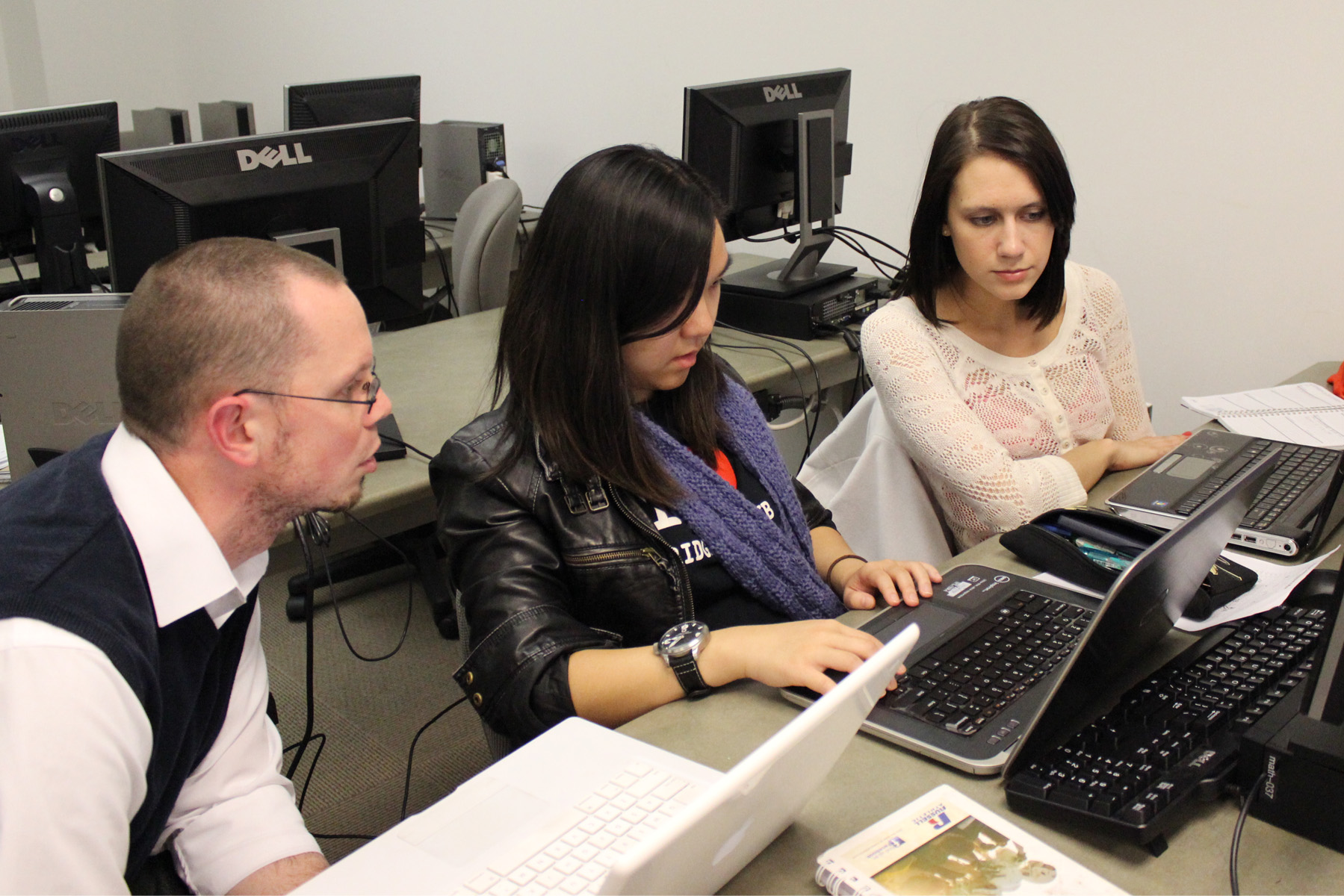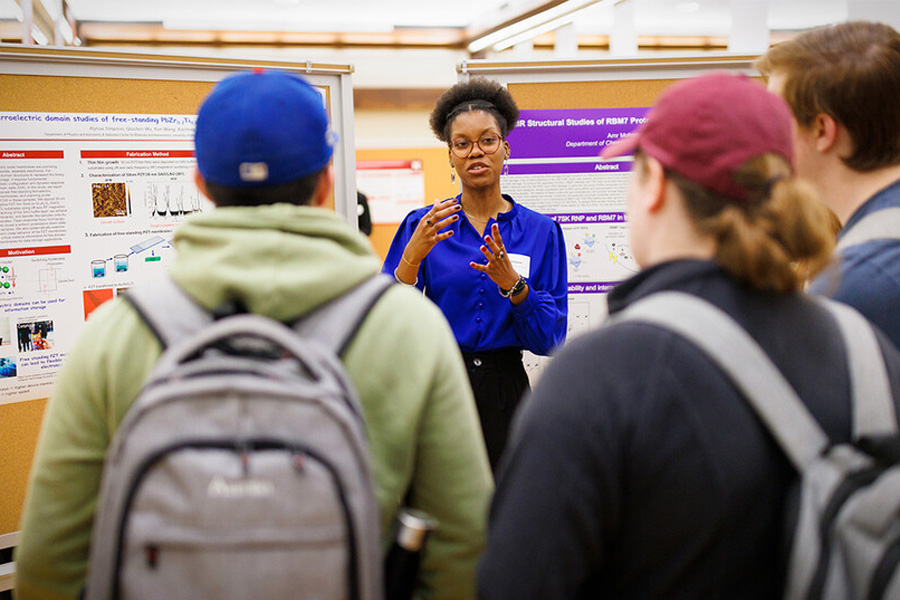
This major develops foundational knowledge and expertise in processing, analyzing, modeling, and implementing software solutions for large data sets. Majors apply computing and modeling to multidisciplinary problems and develop professional skills in teamwork and problem solving in interdisciplinary settings and domains.
Focus Areas
Students select two:
- Artificial Intelligence
- Software Development
- Data Pipeline
- Mathematical Modeling
- Statistical Modeling
- Applied Computing: Journalism and Humanities
- Applied Computing: Sociology
- Applied Computing: Natural Resources
Academics + Experience = Opportunities
Complement academic preparation with experiential learning, creating more opportunities after graduation. Talk to an academic advisor and a career coach about making the most of your time at Nebraska.
Four-year success plan
What to do each year
Catalog
Major requirements and courses
Printable summary
With sample four-year schedule
Transferrable Career Skills
- Expertise in the analysis of large-scale data sources from the interdisciplinary perspectives of applied computer science, data modeling, mathematics, and statistics
- Expertise in the application of computing, informatics, and modeling to solve multidisciplinary problems
- Solving multidisciplinary data science problems as a member of an interdisciplinary team
- Familiarity with ethical challenges in data science, including ethical collection of data, responsible use of data, and algorithmic bias
Experience
Experience is valuable and goes beyond the classroom. We strive to help you connect your academics with research, internships, education abroad, service learning and leadership experiences in data science, such as:
- Interning with Hartford Insurance Company, Hudl, or Sandhills Global
- Learn more about internships
- Researching with the Bureau of Sociological Research
- Learn more about undergraduate research
- Studying abroad in Budapest, Hungary or Bath, United Kingdom
- Learn more about education abroad
- Serving as the Math Club president
- Learn more about leadership in student organizations
- Volunteering with Math Motivators to tutor K-12 students
- Learn more about service learning
Research and Academic Opportunities
Find Solutions for Local Issues

In the interdisciplinary, hands-on Math in the City course (MATH 435), students using mathematical modeling to understand and problem-solve current issues relevant to local organizations.
Engage in Cutting-Edge Research

Join faculty in their research labs to engage with research and creative activity in mathematics and other areas, and present the results to the campus community at the biannual Research Fair.
Intern for Credit

Gain career experience while while earning academic credit for an approved internship.
Opportunities
Your skills in processing, analyzing, modeling, and implementing software solutions for large data sets and solving multidisciplinary problems in interdisciplinary settings will be extremely valuable to a variety of professions. Data science careers are some of the most in-demand across the country and have some of the highest job satisfaction rates.
Examples of Local and Regional Careers
- Data Engineer, Hudl
- GIS Web Developer/Analyst, The North Jackson Company
- Statistical Analyst, Experian
- Data and Research Analyst, Mercer
- Business Analyst, Sandhills Publishing
- Programmer/Analyst, Centrix Solutions
“'Data scientist' typically describes a knowledge worker who is principally occupied with analyzing complex and massive data resources. However, data science spans a broader array of activities that involve applying principles for data collection, storage, integration, analysis, inference, communication, and ethics...[A]ll undergraduates will benefit from a fundamental awareness of and competence in data science.”
National Academy of Sciences, Engineering, and Medicine
Examples of MATH Courses
Core Requirement
Linear Algebra for Data Science | 315
Fundamental concepts of linear algebra, including properties of matrix arithmetic, systems of linear equations, vector spaces, inner products, determinants, eigenvalues and eigenvectors, and diagonalization, with emphasis in data science applications.
Professional Experience
Math in the City | 435
A research experience modeling problems of current interest to the local community, businesses, or government.
Focus Area
Graph Theory | 452
Theory of directed and undirected graphs. Trees, circuits, subgraphs, matrix representations, coloring problems, and planar graphs. Methods which can be implemented by computer algorithms.
Focus Area
Introduction to Topology | 471
Elementary point-set and geometric topology. Point-set topics include topological spaces, continuous functions, homeomorphisms, connectedness, compactness, quotient spaces. Geometric topology topics include Euler characteristic, classification of surfaces, and other applications.
Focus Area
Probability Theory | 487
Probability, conditional probability, Bayes' theorem, independence, discrete and continuous random variables, density and distribution functions, multivariate distributions, probability and moment generating functions, the central limit theorem, convergence of sequences of random variables, random walks, Poisson processes and applications.
Focus Area
Stochastic Processes | 489
Markov chains, continuous-time Markov processes, the Poisson process, Brownian motion, introduction to stochastic calculus.
Data Science at Nebraska
Data science is a science major in the College of Arts and Sciences (CAS). Our liberal arts degrees provide a broad education across the sciences, social sciences, and humanities, preparing students for a variety of careers.
Let curiosity move you.

Contact Us
Academic and Career Advising Center
107 Oldfather Hall
402-472-4190
casadvising@unl.edu